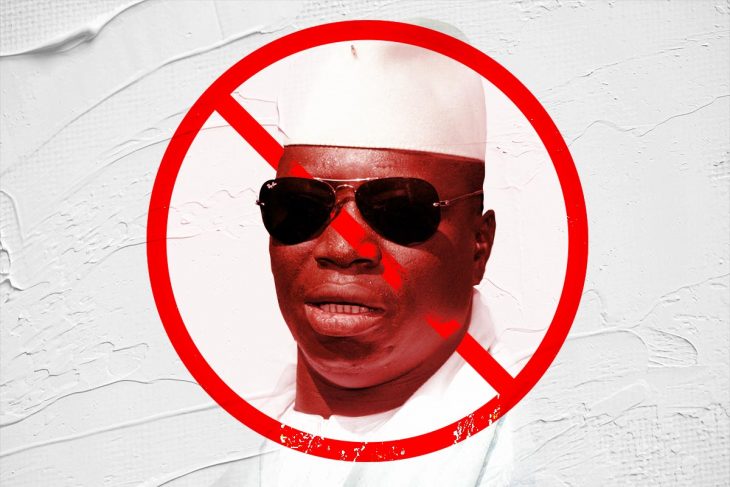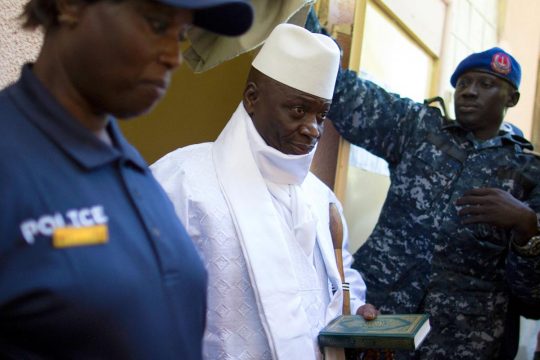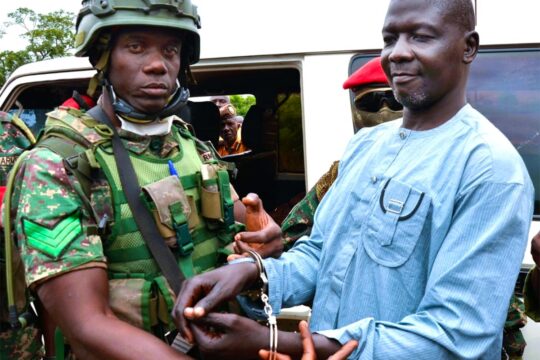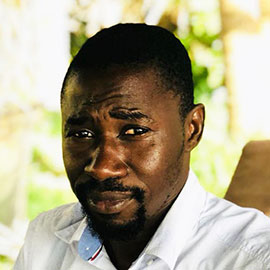After public hearings remarkably popular with Gambians, 193 witness testimonies and a series of powerful confrontations with high-level officials of the Jammeh dictatorship, the Gambia Truth, Reconciliation and Reparations Commission (TRRC), finally submitted its final report to the small West African country’s renewed president, Adama Barrow, and was made public on December 24.
Under the law, the government has six months to issue a White Paper and officially indicate how it will implement the report’s recommendations. While it has recommended dozens of prosecutions, including suggestions on how to bring the exiled dictator to justice, the final report includes numerous other recommendations to Gambian society, its government and legislators, aimed at preventing a recurrence of the crimes documented by the Commission.
Need to probe disappearances
One of the TRRC's most perturbing findings are the disappearances. “Yahya Jammeh used enforced disappearance as a tool and an effective modus operandi to neutralize his critics and perceived enemies by putting them outside the reach of the law,” said the Truth Commission. In its volume 12, the Commission detailed a list of over 100 disappeared people whose cases were solved but also whose cases require further investigation.
Although its investigations have been praised, Gambia’s Truth Commission has had significant capacity issues regarding forensic expertise. It did only one successful exhumation of seven bodies at Yundum Barrack, believed to be bodies of soldiers killed on November 11, 1994.
The Commission heard evidence that several victims of the “Junglers” – the feared hit-squad operating on the orders of Jammeh –, including 67 West African migrants, were buried in diverse places including bushes in Senegal, in wells and gardens of ex-president Jammeh. But it could not confirm the exact locations.
During his 22 years in power, Gambia’s eccentric leader Jammeh went around with prayer beads, a Quran and what looked like a sword. Jammeh built a cult following, and there were rumours of ritual killings. The Commission said it “received evidence suggesting that Yahya Jammeh had disappeared babies. However, the Commission was unable to fully investigate these allegations to establish the veracity of these claims”.
The Commission also wanted further investigations into allegations that Jammeh was feeding his crocodile in Kanilai with human remains.
Therefore, in its final report, the TRRC strongly recommended that Gambia’s government establish an international forensic team to further probe cases of disappearances, to exhume and identify the remains of victims.
It urged government “to without delay identify the exact locations where the victims were buried, including the wells and graves mentioned by the witnesses that are located in both The Gambia and also in Casamance, Senegal”, and “take all reasonable steps to ensure the security and full protection of all the sites where the remains were buried and are yet to be exhumed.”
Top officials to be banned
The TRRC recommended a series of targeted vetting measures in the Gambia’s institutions.
At the National Intelligence Agency (NIA), there was a “talk-true” electrocution machine, to which its agents strapped victims to draw confessions. One of the highest officials targeted by the TRRC final report is current director Ousman Sowe, who after taking over the head of the NIA in 2017 allegedly started a controversial renovation exercise that ‘destroyed evidence’, the Commission concluded in its volume 13 dealing with the NIA.
“While he admitted to removing instruments of torture and changing the character of the room, he however insisted that it was not intended to conceal evidence,” said the Commission, which recommended that Sowe be sacked and banned from holding public office for 10 years.
Sowe is among a dozen officials — some in top government positions, whom the TRRC recommends should be banned from holding public office.
Improve security sector recruitment
During its investigations, the Commission revealed also that some very senior people especially in the prison services and at the NIA lacked basic education requirements. “Many of the killers among the Junglers were promoted to very high ranks who had no matching qualifications,” said the Commission in its volume 1. “For instance, Gen. Sulayman Badjie, Commander of the Junglers, became almost a de facto Prime Minister, the number two most powerful person in the country at the time, yet he did not even possess a high school diploma.”
The Commission recommended more stringent recruitment processes for the security and prison services. It also recommended in its volume 8 introducing “a mandatory course for all soldiers on human rights and on the role of the military in a democratic society”.
Archaic prison laws
Jammeh, according to the Commission’s findings, used the prison system to “send perceived opponents and any person he saw as a threat to his government”. Like the NIA, the leadership and staff of the prison services are poorly trained and equipped.
“The existing archaic prison laws should be repealed and replaced with modern and progressive laws that meet the requirements of a modern democratic society,” recommended the Commission. Also, “the state should develop alternative systems of imprisonment – such as probation and community service – to ease overcrowding in prison.”
NIA units to be closed
Some critical state institutions such as the prison system, the NIA, the army and the police were used by Jammeh as a weapon to terrorize the population and his perceived enemies.
“The NIA must be completely overhauled and re-orientated to ensure that its principal function and duties are limited to its traditional intelligence gathering role and such related responsibilities,” said the Commission. “The NIA must be completely stripped of its policing powers which allowed the institution to concern itself with ordinary matters that traditionally fall within the jurisdiction of the police in the exercise of its law-and-order duties.”
In particular, it said that the Special Investigations Unit of the NIA, which over the years had been used to oppress and brutalize perceived opponents of Yahya Jammeh and those who had the misfortune of coming into contact with the NIA, “must be disbanded immediately”-
The Commission recommended that the NIA close its detention facilities and overhaul its recruitment process to have better equipped personnel.
Urgent reform of media laws
“The over 140 arrests and detentions of media practitioners shows a deep-seated intolerance for freedom of expression and the media exercising its functions of promoting public participation, accountability, and democracy”, as “it is obvious from the evidence that Jammeh did not want or entertain any criticism of himself or his government from any quarter”, said the Commission in volume 7, which focuses on attacks on media and political opponents.
One of the earliest victims of the Junglers was Deyda Hydara, founder and editor of The Point newspaper, who was shot and killed on December 16, 2004.
As well as torture, killings and disappearances, Jammeh also used the laws to muzzle the press. “With immediate effect, repeal all repressive legislation, including legislation that does not comply with international and regional human rights law,” recommended the Commission.
Constitution needs to be replaced
After the July 1994 coup, Jammeh and his team suspended the parliament. The military leadership making the decrees were the de facto parliament and the executive. “These Decrees were used by the Junta to violate the rights of Gambians” said the Commission in volume 15.
These decrees would make their way into the Constitution. “The 1997 Constitution is deeply flawed due to the number of amendments that were made to the original and needs to be replaced with one that meets the aspirations of the Gambian people,” said the Commission.
“The government should undertake to at all times respect the Constitutional provisions on judicial independence and the principles of separation of powers as enshrined in the Constitution of The Gambia,” added the Commission.
Keeping the death penalty
In August 2012, Gambia’s former leader Jammeh removed a moratorium on the death penalty and allowed the execution of nine death row inmates. Investigations by the Commission found that the “manner in which it was carried out procedurally was unlawful, as it was not conducted in accordance with provisions laid down under the Criminal Code”. Jammeh’s Justice Minister, who participated in organizing the execution of the inmates, failed to pay due regard to the law, said the Commission.
However, the Commission failed to recommendremovingthe death penalty from the statute book, although this could facilitate extradition requests. Currently, three former top officials are indicted for human rights violations abroad: Ousman Sonko in Switzerland; Michael Sang Correa in United States; and Bai Lowe in Germany. Switzerland made it clear it could not extradite Sonko because of the existence of the death penalty in Gambia.








